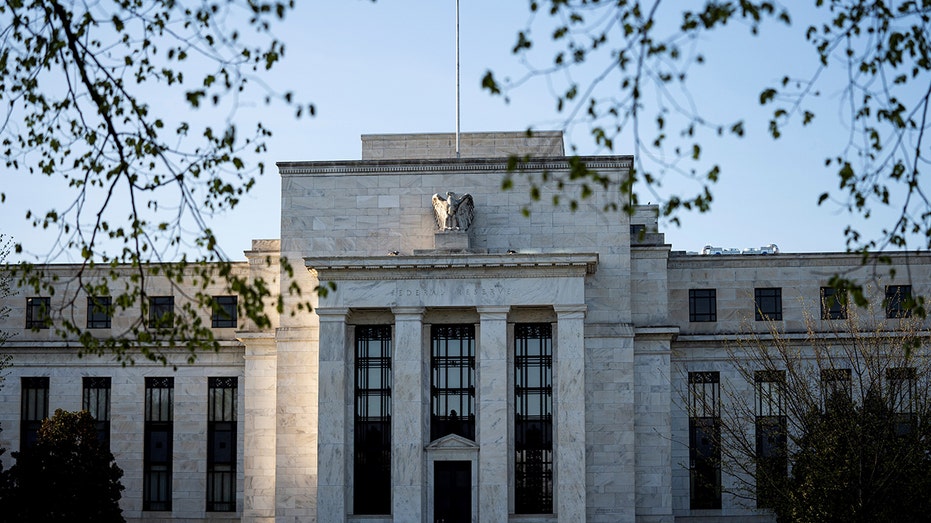Federal Reserve expected to ramp up inflation fight with super-sized rate hike
Fed expected to move more aggressively to cool record-high inflation this week
Is it too late for Fed to avoid triggering a recession?
Charles Schwab chief investment strategist Liz Ann Sonders discusses how the Fed can cool inflation on 'The Claman Countdown.'
The Federal Reserve is expected to ratchet up its fight to tame red-hot inflation on Wednesday with the first double-sized rate hike in two decades, a move that threatens to slow U.S. economic growth and exacerbate financial pressure on Americans.
With inflation soaring to a new 40-year high in March, the Fed is under mounting pressure to move more aggressively to cool demand and slow surging consumer prices.
FED HOPES TO ENGINEER SOFT LANDING, BUT HISTORY SHOWS IT WON'T BE EASY
Central bank policymakers raised rates by a quarter-percentage point in March, but are almost certain to approve a steeper, half-percentage point hike at the conclusion of their two-day meeting on Wednesday. It would mark the fastest rate increase since 2000. Many traders believe the Fed will hikes rates by another half-point in June, and possibly July too.
"The Fed would shock markets if it failed to deliver on more aggressive policy via a 50-basis point rate hike on Wednesday," said Danielle DiMartino Booth, CEO and chief strategist at Quill Intelligence and a former adviser to a previous Dallas Fed president. She noted the focus will almost immediately shift to "just how many half-point hikes the Fed expects to initiate over the balance of 2022."
On top of that, the Fed will likely begin shrinking its nearly $9 trillion balance sheet, a move that will further tighten credit for U.S. households. Minutes from the Fed's March meeting suggest the central bank will begin unwinding at a maximum monthly pace of $60 billion in Treasurys and $35 billion in mortgage-backed securities. By comparison, the Fed trimmed its balance sheet at a rate of $50 billion a month from 2017 to 2019.
Many economists believe the Fed is acting too late to quell inflation, with the Fed's benchmark rate sitting at a range of just 0.25% to 0.5%. Adjusted for inflation, the key interbank lending rate is actually negative.

Federal Reserve Chair Jerome Powell pauses during a news conference in Washington on Jan. 29, 2020. (AP Photo/Manuel Balce Ceneta, File / AP Newsroom)
As a result, Fed policymakers, including Chairman Jerome Powell, have telegraphed to markets in recent weeks that they will act "expeditiously," confirming that several half-point rate hikes are likely on the table in coming months as they seek to neutralize rates at a level that neither boosts nor hurts the economy.
"It is appropriate to be moving a little more quickly," Powell said recently during a panel discussion at the International Monetary Fund and World Bank spring meetings. "I also think there’s something in the idea of front end-loading whatever accommodation one thinks is appropriate. So that points in the direction of 50-basis points being on the table."
The question now is whether the Fed can successfully engineer the elusive soft landing – the sweet spot between tamping down demand to cool inflation without sending the economy into a downturn. There are growing fears on Wall Street that central bank policymakers will fail to do so: Goldman Sachs, Bank of America and Deutsche Bank are among the firms forecasting a recession within the next two years.

The U.S. Federal Reserve in Washington on April 20, 2022. (Liu Jie/Xinhua via Getty Images / Getty Images)
And last week, the Bureau of Labor Statistics reported that the economy unexpectedly shrank in the first quarter of the year, marking the worst performance since the spring of 2020, when the U.S. economy was still deep in the throes of the COVID-induced recession.
"The window for the Fed to engineer a soft landing has likely closed, since the economy is already starting to deteriorate before the bulk of the Fed's inflation-fighting tightening actions have taken place," said DiMartino Booth. "The last economic pillar standing is the job market, but we’re already seeing a weakening in new job posting."
GET FOX BUSINESS ON THE GO BY CLICKING HERE
Powell has pushed back against concerns that further tightening by the central bank will trigger a recession and has maintained optimism that the Fed can strike a delicate balance between taming inflation without crushing the economy. Still, he has acknowledged the difficulty of the task ahead and said it is "absolutely essential" for central bankers to restore price stability.
"Our goal is to use our tools to get demand and supply back in sync, so inflation moves back into place, without a slowdown that amounts to a recession," Powell said. "I don't think you'll hear anyone at the Fed say that's straightforward and easy. It's going to be challenging."





















